Last Updated: 1 year ago
Do you know there are some smells that cats hate so much that they’ll avoid them at all costs?
Such knowledge might come in handy when you’re trying to train your cat not to scratch your furniture or keep your pet away from plants.
If you’re curious to learn more, keep reading to discover what smells do cats hate.
19 Smells Cats Hate
Cats have a fantastic sense of smell, with over 45–80 million olfactory receptors in their nose to compensate for the lack of taste buds.
Humans have only 5 million, so we can smell only a fraction of what our cats can.
Moreover, cats have a Jacobson’s organ on the roof of the mouth that allows them to deeply analyze any smell. That’s why your cat remains with an open mouth when they catch an interesting scent.
Thanks to these superb senses, it’s no wonder that cats can’t stand certain aromas and run in the opposite direction.
Let’s see what smells do cats hate.
#1 Citrus
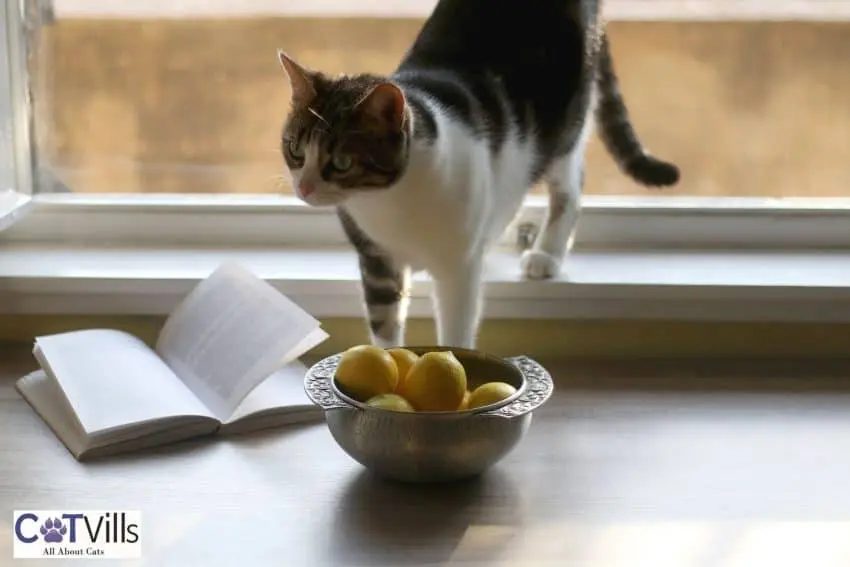
Citrus fruits, such as oranges, limes, lemons, and grapefruits, have a peculiar aroma that appeals to most humans.
We connect the scent with something delicious to eat. However, cats find it repellent because it’s too strong for their delicate noses.
They might also detect aromas that our noses aren’t capable of processing. The cat-repellent abilities of citrus are well known.
That’s why many owners often advise that you place orange peels to keep the cat off the counter or place the peels around plants you wish to protect.
But citrus fruits are also toxic for cats and dogs and cause stomach discomfort, vomiting, and diarrhea.
Fortunately, you’ll rarely find a cat that likes to chew on orange peels.
#2 Mint
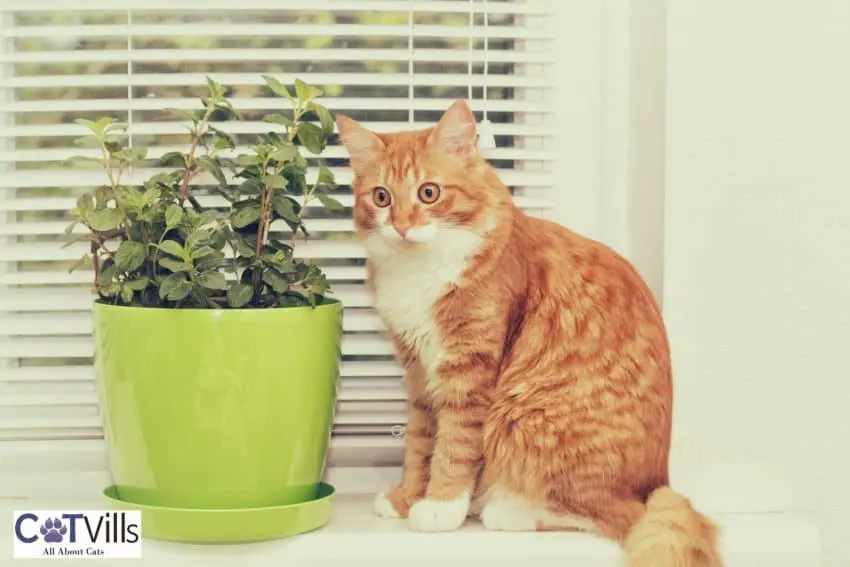
Who doesn’t like the refreshing smell of mint or eucalyptus?
While mint and eucalyptus have health benefits for humans, cats hate mint aromas.
That’s a little strange since mint and catnip are from the same family.
But while many cats get high on catnip, others stay as far away from mint as possible.
Other plants with minty scents, such as wintergreen and menthol, are also likely to repel cats.
The same goes for eucalyptus, which it’s often used in eco-friendly products to repel cats.
Still, keep any mint-related plants out of your cat’s reach to be on the safe side.
Mint and eucalyptus are toxic to cats when ingested.
#3 Lavender (Lavandula)
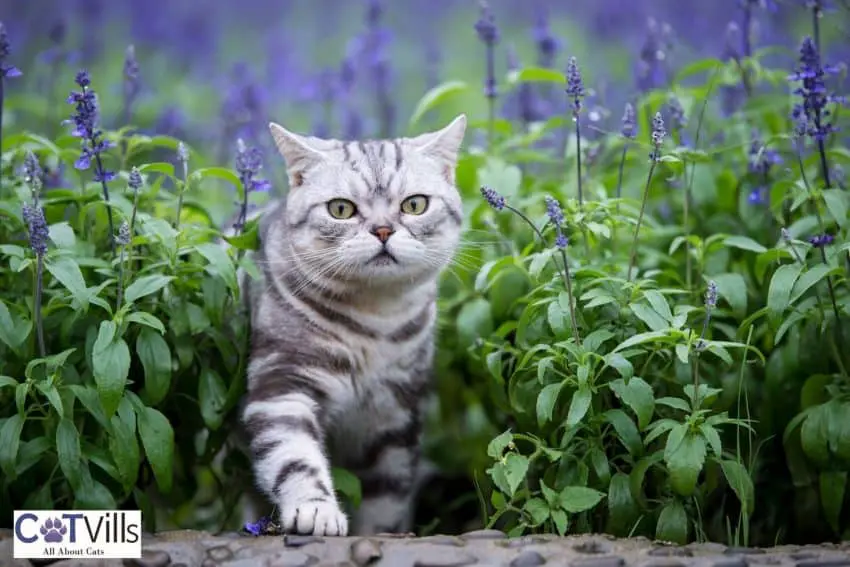
With its pleasant aroma and distinctive purple flower, lavender is a common garden plant found in many gardens.
People often use it in aromatherapy for its calming effect and stress-reducing properties.
While lavender has a pleasant scent for people, the aroma is too pungent for our cat’s fantastic olfactory receptors.
Many cats hate it and stay away from lavender plants. But I’ve also seen cats sleep in lavender bushes with no ill effects.
Moreover, the ASPCA reports that lavender and lavender oil are toxic for cats and dogs.
Don’t try to use lavender to calm down your anxious cat, or you can poison your pet by accident.
Ask your vet about anti-anxiety products suitable for cats.
#4 Geranium
Geranium is another common plant whole smell cats hate.
That’s not surprising since people say geranium has a citrus-like scent or a lemony-green aroma, and we know how cats feel about citrus.
While people often plant geranium in the garden to keep cats away, you should know that the plant is toxic to pets.
It can cause skin irritation and vomiting if your cat chews on the leaves.
#5 Rosemary and Thyme
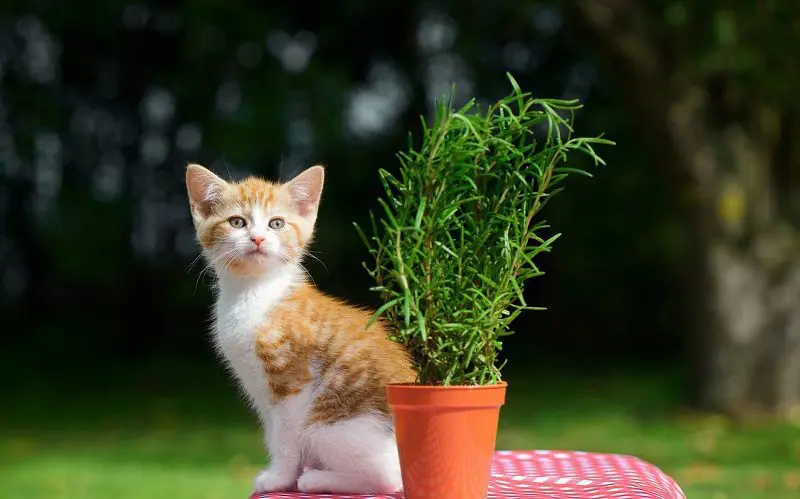
Rosemary and thyme are among the most common herbs in cooking and give food a mouth-watering taste.
Cats don’t seem to mind these herbs when they steal food from our plates.
But surprisingly, many cats hate the smell of rosemary and thyme.
That’s why people often recommend planting rosemary around your garden if you wish to keep cats away.
Fortunately, both thyme and rosemary aren’t among the toxic plants for cats.
Some cat food brands also use rosemary extract as a preservative. That could explain why your cat turns up their nose at the food.
#6 Rue
Besides rosemary and thyme, you can add rue to the list of smells cats hate. Usually, people use rue to treat breathing problems, arthritic pain, headaches, and cramps.
However, rue has a bitter/acrid scent that’s too offensive for your cat’s nose.
As such, most cats will stay at least six to ten inches away from this herb. Still, be careful if you use rue to keep cats away.
The smell doesn’t bother all cats, and it’s dangerous for cats to ingest it.
Moreover, while rue has medical properties, large doses are toxic to humans, causing vomiting, stomach pain, and death.
And you shouldn’t handle it with bare hands since it causes burn-like blisters.
#7 Pennyroyal
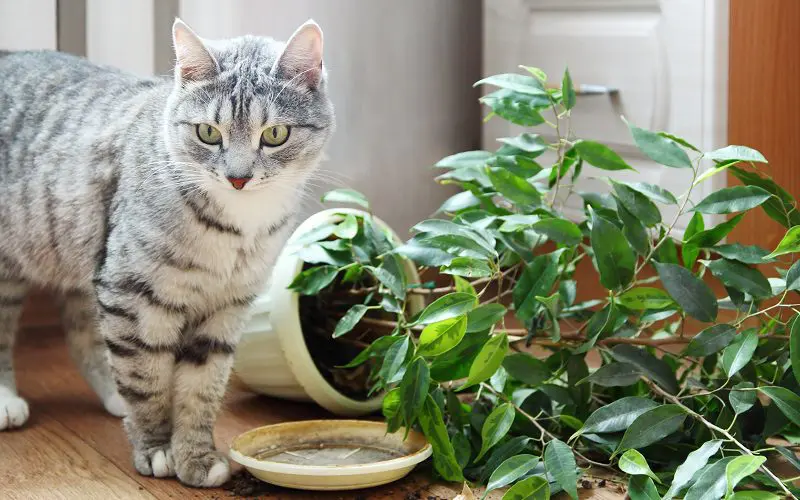
Pennyroyal has a strong mint scent, which explains why your feline friend doesn’t like this plant at all.
People use the leaves and oil from the plant to make medicine for breathing problems because of its strong mint aroma.
However, while similar to mint, this plant contains some dangerous chemicals for humans and cats.
As such, you should be careful when you use this plant to keep the cat out of the garden.
And never use pennyroyal oil. It’s very toxic to cats and can cause severe neurological issues.
#8 Spices
While many people love the spicy aroma of pepper, curry, and other spicy herbs, cats don’t.
Just imagine how intensive the smell must be for your cat’s senses!
As a whole, spicy or heavily seasoned food isn’t good for cats because it upsets their stomach.
That’s probably one of the reasons why cats are wary of anything that gives off such a pungent scent.
Moreover, some spicy peppers can be toxic if ingested and cause extreme stomach distress.
So, don’t sprinkle pepper flakes on the ground because your cat can swallow them when they groom.
#9 Cinnamon
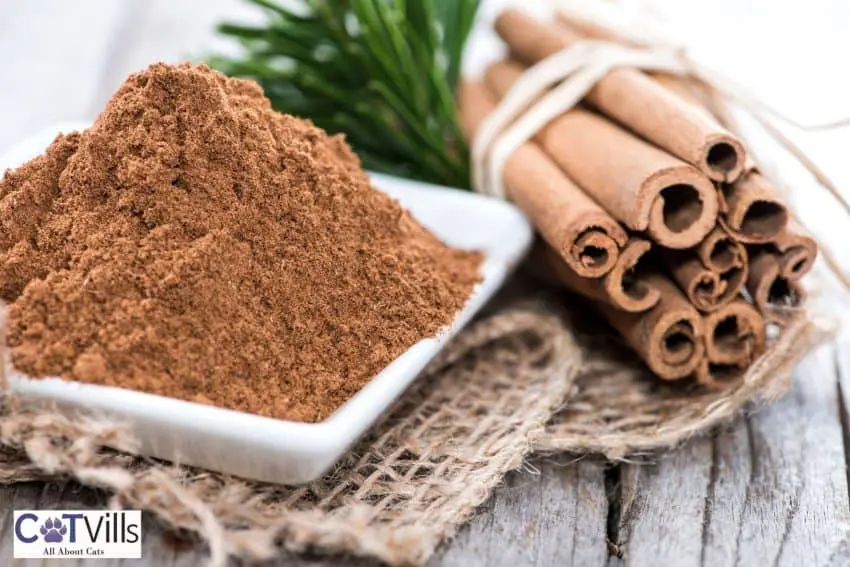
Cinnamon has an enticing, spicy scent that almost everybody loves, especially in combination with milk.
Still, many felines strongly dislike the hot, spicy cinnamon scent and don’t want anything to do with it.
So, your cinnamon cookies should be safe from grabby paws!
Moreover, cinnamon is non-toxic to cats, as stated by the ASPCA. You can use it to keep cats away from your favorite possessions without harming them!
#10 Pine/Cedar
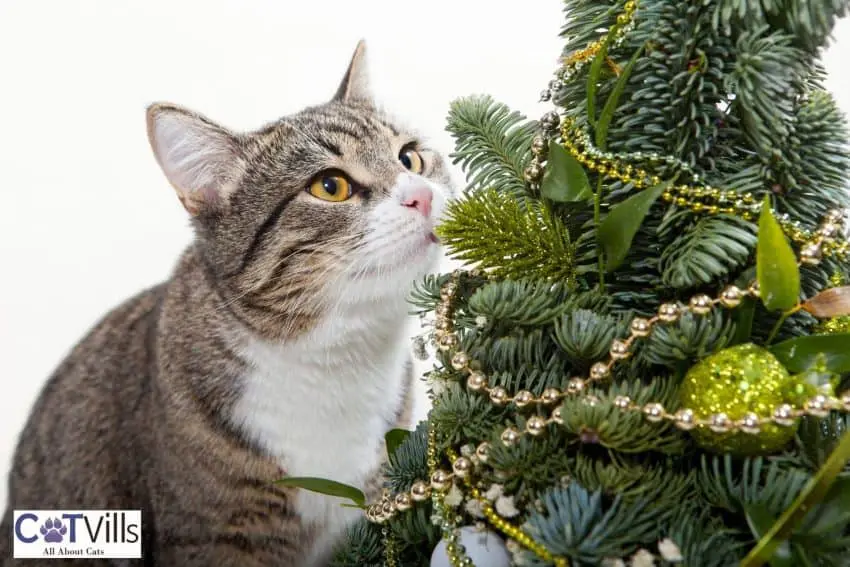
How could cats hate pine when they have such a fascination with Christmas trees?
Well, maybe cats like to destroy Christmas trees because they hate the pine smell so much.
Joke aside, a lot of cats don’t like pine or cedar, even though manufacturers used it to produce natural cat litter.
It’s not a universally hated scent, but many cats are put off by the smell’s intensity and prefer unscented litter.
Fortunately, there are other ways to eliminate litter box odors.
#11 Bananas
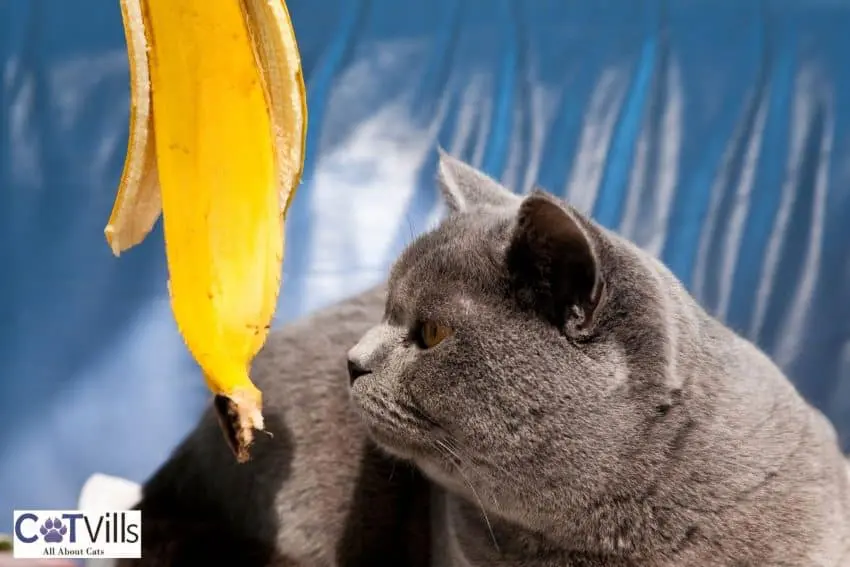
Who could hate the sweet smell of bananas?
As it turns out, some cats really hate bananas and would turn their backs on you when you let them smell them.
I suspect it has to do with chemicals used on the peel to preserve the bananas.
We might not be able to detect these faint traces of chemicals, but it won’t be a problem for your cat’s olfactory receptors.
In general, bananas aren’t harmful or toxic to cats. Some cats might even enjoy them as an occasional treat.
But be careful not to spoil your cat too much since bananas are high in sugar.
#12 Coleus Canina
You might know Coleus Canina as a scaredy-cat plant, but do you know why people have named it so?
Coleus Canina has a smell that resembles a skunk and is considered a cat/dog repellent.
After all, who doesn’t hate that awful skunk smell that lingers for days?
The plant releases an unpleasant scent when someone brushes against it or breaks leaves/stems. As such, most cats don’t make the mistake of going twice near it.
#13 Dirty Litter Box
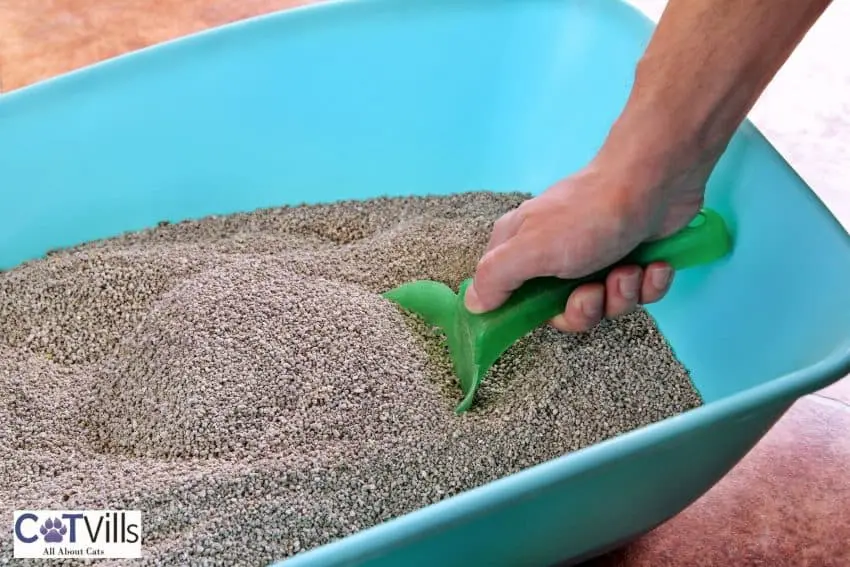
No one likes a dirty bathroom, especially clean creatures, such as cats.
Your cat will do their business anywhere else but in an unclean litter box, so keeping the litter box clean is a necessity.
Moreover, if you have multiple cats, they might hate the smell of the other cat’s waste, especially if the cats don’t like each other.
#14 Essential Oils
Essential oils have risen in popularity in recent years, and we often used them for various ailments.
However, cats hate the smell of essential oils because it’s too intense and overpowering.
Moreover, most essential oils aren’t safe for cats because they lack the necessary liver enzymes to break them down.
As such, one possible side effect is liver failure.
These oils can also be absorbed through the skin or ingested while grooming and lead to ataxia, drooling, vomiting, and respiratory distress, among a few.
Cats who inhale essential oils might develop watery eyes and noses or have trouble breathing.
#15 Strong Perfumes
In general, cats aren’t big fans of perfumes and tend to run away from the room when you get near them with a perfume bottle in hand.
In most cases, the perfume scent is far too strong for the sensitive nose of your cat, and it can irritate your cat’s lungs.
Some perfumes also use scents and essential oils that are toxic for cats.
As such, you should be careful not to poison your kitty by accident.
#16 Onions
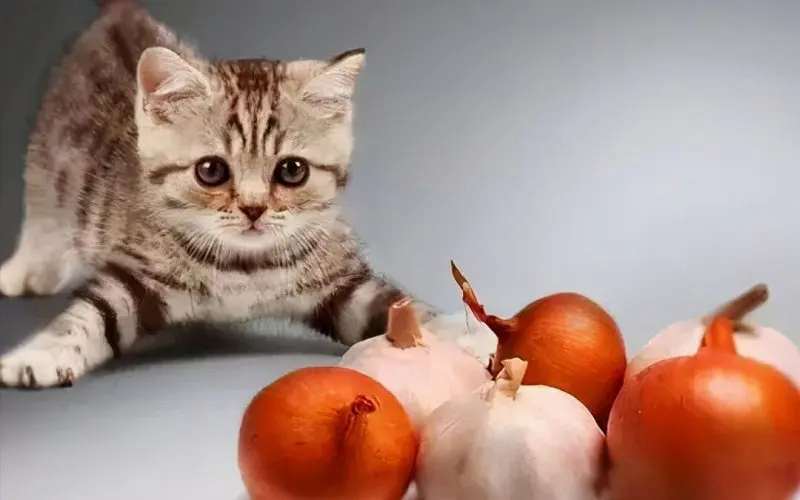
You know how teary you get when you cut onions. That’s because this vegetable contains chemicals that irritate the eyes.
Imagine how your feline feels around onions with their superb sense of smell! It’s no surprise that some cats hate onions and want nothing to do with it.
Moreover, onions are very dangerous for cats if ingested because they cause anemia.
#17 Household Cleaners
There’s nothing more pleasant than a freshly cleaned house! But not all cats like the smells of household cleaners you use.
As I already said, cats hate lemon and pine, which manufacturers often use for cleaners.
And cleaners often contain a bunch of chemicals that can irritate your cat’s nose.
So, most cats run away from the room when they detect the pungent aroma of your household cleaners.
#18 Other Cats
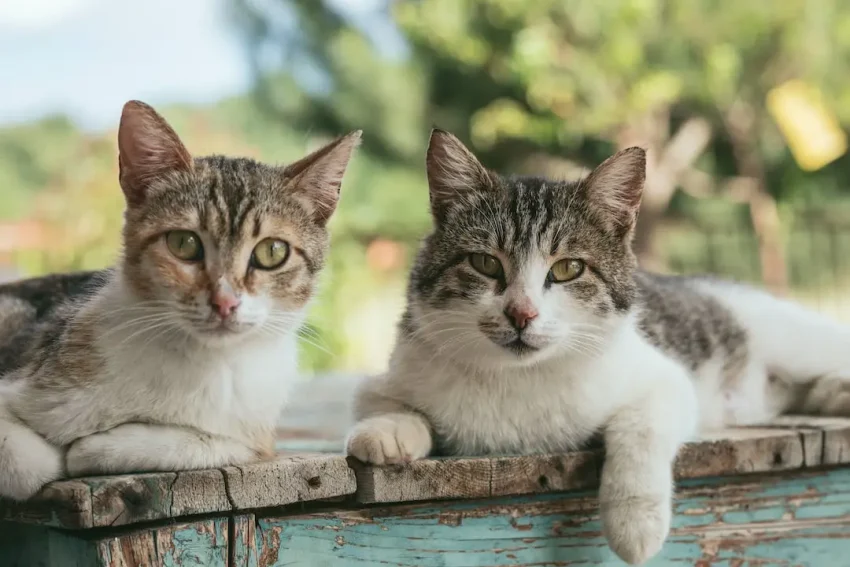
Have you ever petted a stray cat and then gone home, only for your kitty to act mad? That’s because your cat hates the smell of unfamiliar cats in its territory.
Cats consider you and your home a part of their territory. As such, they get mad when they think another cat is trying to steal its source of food and attention away.
Fortunately, cats can get along with each other, but they need a bit of time to get used to each other’s scents.
#19 Coffee Grounds
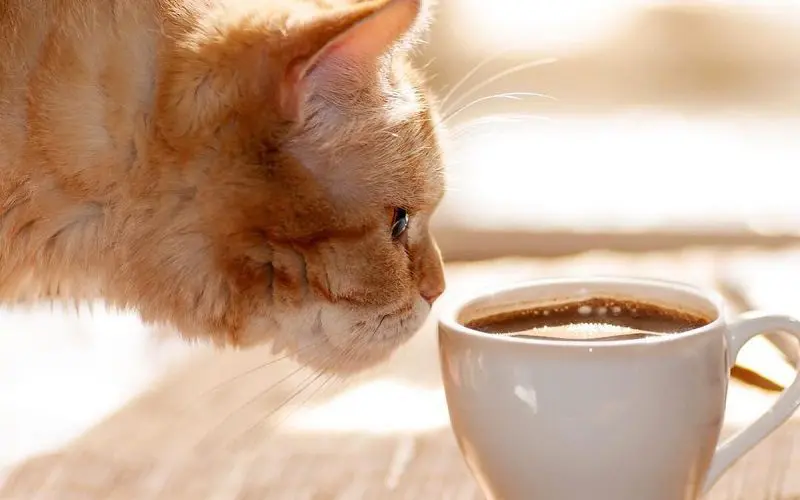
For many people, the smell of fresh morning coffee is the best aroma in the world.
However, many cats hate the potent smell of coffee grounds!
As such, you can sprinkle some coffee around the areas where you don’t want your cat to enter.
However, ensure your cat doesn’t ingest any coffee grounds. Coffee contains caffeine, which is toxic to cats.
Conclusion
As you can see, there’s a good reason why cats hate certain smells and don’t dare go near them.
The pungent aroma prevents the cats from chewing on plants that could kill your pet if they consume enough or get exposed to dangerous chemicals.
If a scent is strong for you, it’s probably unbearable for your cat.
Keep that in mind, when you light candles and don’t use essential oils around your cat.
What do you think about these smells cats hate? Which scents does your cat avoid? Tell us in the comment section.
Resources:
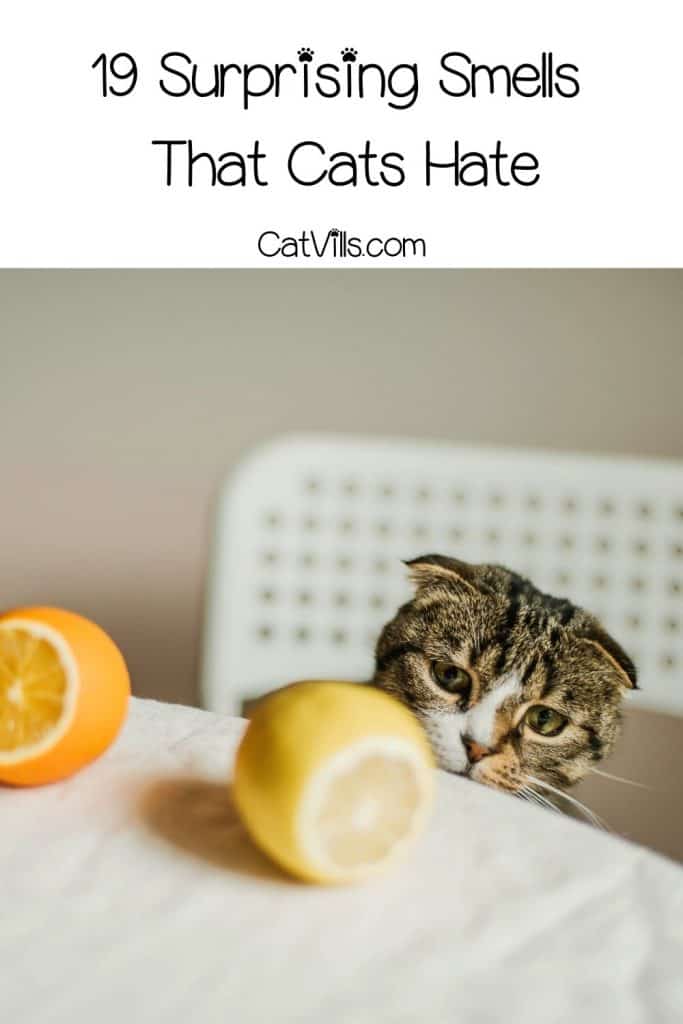

This is so interesting especially since most of those smells are in my home. Interesting how cats are.
Great list of smells that cats hate. People often don’t realize how toxic some things are for cats. Geraniums is one of those plants that I forgot was toxic for cats.
I didn’t know some of these. The dirty litter box I get it because one of my cats will poop outside the box if it’s too messy.
I was just thinking how I could start spraying the surfaces we don’t want scratched with some lavender essential oils but then I read the last part. Good to know!
I had no idea that cats didn’t like the smell of lavender or mint! I’ll have to make some notes for when we adopt a kitty in the future.
wow! I didn’t know that cats hate these smells. It can be useful sometime! 🙂
I will have to try one of these in our bedroom to keep her out at night. She likes to try to sleep on our bed lately, and it’s too rough on my allergies. Thanks!
We are raising cats that’s why this is really helpful so I will be aware and my cats won’t easily be irritated. Thanks for sharing
I’ve never knew that our cats really hates these scents, this information surprise me a lot.
My cat’s favorite place to rest outdoors was the herb garden. LOL, cats are my favorite because they refuse to fit in a box!
I didn’ t know anything about the smells which cat hates. Thanks for sharing this I learned something today.
Omg i hope my cat forgives me for i will try these to her. I hope this won’t give harm. I just wanted to see her reaction. It would be epic! I didn’t know they hated these smells. Thank for sharing us this information. This is cute!
I have a 4 month old Kitty (Zoomie) and she won’t stay off my cabinets – so I’m going to try one of the smells that they don’t like but is safe – all the information was very informative – thank you
This is so interesting, forwarding to my son who has a cat. I had no idea these were things that upset cats!
I never really thought about this before. Roxi doesn’t seem to have any obvious issues with smells of anything in the home.
I had no idea that cats did not like the smell of citrus.
Well, they hate most smells that I love. Guess I’m not getting a cat LOL!
My cats absolutely hate the smell of bananas and mint. One of my cats is always trying to see what I’m doing, and when I brush my teeth he’ll sniff my toothbrush…and he hates the mint smell, you can tell. Same goes with bananas.
wow! How many smells they hate. It-s almost all my kitchen! 🙂
I’ve tried some from this list to protect my plants against those stray cats and some are really proven effective.
What an interesting list. I had no idea these were things that cats disliked, other than the obvious (like citrus, onions, etc).
This is super cool and so interesting 😉 My cat does open his mouth sometimes when he smells something and now I know why 😉 We have a stray cat outdoors that keeps pooping in our flower bed and we are going to add geraniums, lavender and others to deter him 😉
I knew cinnamon would be on this list. Our cat hates cinnamon. She doesn’t like lotion either. If we’ve used it she won’t let us pet her.
I had absolutely no idea that they didn’t like these smells. That is great to know!